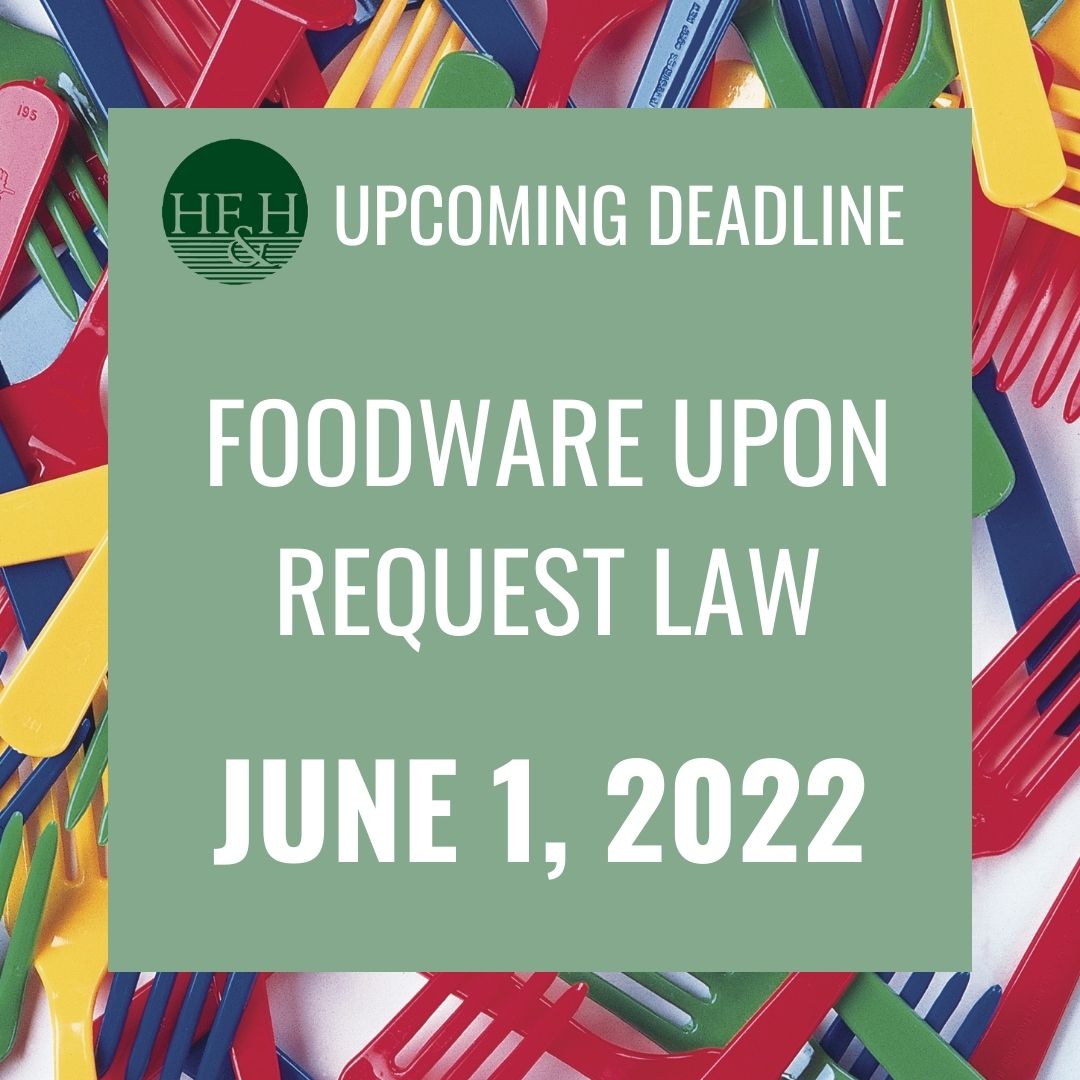Get a free consultation to discuss your needs
Blog

HF&H Answers AB 1276 Frequently-Asked Questions
What is AB 1276?
Passed in the 2021 legislative session, AB 1276 (Carrillo, 2021) prohibits food facilities and third-party food delivery platforms from providing any single-use foodware accessory or standard condiment to a customer unless requested, among other requirements. This expands on current state law regarding straws (AB 1884), and follows in the footsteps of local movements for “skip the stuff” ordinances.
What counts as a single-use foodware accessory or standard condiment?
A “single-use foodware accessory” includes single-use items such as: forks, knives, spoons, sporks, chopsticks, condiment cups and packets, straws, stirrers, splash sticks, and cocktail sticks (PRC §42270(e)). A “standard condiment” includes items such as: ketchup, mustard, mayonnaise, soy sauce, hot sauce, salsa, salt, pepper, sugar, and sugar substitutes (PRC §42270(f)).
The law prohibits those items from being bundled or packaged in a way that prohibits the consumer from taking only the item desired and encourages use of bulk and refillable dispensers (PRC §42271(b)).
What is required for local jurisdictions?
The bill requires jurisdictions to authorize an enforcement agency to enforce the bill on or before June 1, 2022 (PRC §42272(a)).
What if my jurisdiction already has, or is interested in adopting, a single-use foodware ordinance that is more restrictive than AB 1276?
Nothing in AB 1276 prevents a jurisdiction or other local public agency from adopting an ordinance that is more restrictive than AB 1276 (PRC §42271(h)). Jurisdictions with more restrictive single-use foodware accessory ordinances in place are encouraged to evaluate the requirements of their local ordinance as compared to the requirements of AB 1276, to ensure minimum AB 1276 requirements are met. Please consult the jurisdiction’s legal counsel regarding policy updates that may be necessary.
How should my jurisdiction designate an enforcement agency? Is an ordinance required?
The bill does not prescribe how a jurisdiction should designate an enforcement agency. Therefore, this decision is dependent on jurisdiction-specific procedures for authorization, and is subject to legal counsel interpretation. Examples of potential options to be considered include, but are not limited to: an ordinance or municipal code update, City Council or Board of Supervisors resolution, or, if permitted, an administrative policy. An enforcement agency must be designated by June 1, 2022. Jurisdictions should be aware of this deadline when planning upcoming City Council and Board of Supervisor agendas. Please consult your legal counsel regarding recommended actions.
Who should my jurisdiction designate as the enforcement agency?
The bill does not specify what entity(ies) should be designated as the enforcement agency. This decision is dependent on jurisdiction-specific procedures and is subject to legal counsel interpretation. Examples of potential options include: the jurisdiction’s code enforcement officials, public works department, environmental health department, or other party given authorization to enforce Public Resource Code requirements. Please consult your legal counsel regarding recommended options.
Are there specific penalties for the enforcement process?
The bill states that the first and second violations of the bill result in a notice of violation, and any subsequent violations result in a fine of twenty-five dollars ($25) for each day in violation, but not to exceed three hundred dollars ($300) annually (PRC §42272(b)).
How does the State plan to monitor and enforce AB 1276 requirements upon jurisdictions?
The bill does not assign a specific state agency to verify that jurisdictions are enforcing the law. Advocacy groups have submitted a request for clarification to the State Office of Legislative Counsel on this issue, among others.
Disclaimer
This information is based on HF&H’s current understanding and interpretation of AB 1276 and should not be considered legal advice. Jurisdictions should consult their legal counsel before making decisions regarding the implementation and enforcement of AB 1276.
HF&H is here to help!
Need further guidance on local ordinances or state legislation? For more than three decades, HF&H has helped hundreds of local agencies navigate the myriad of solid waste diversion and water/wastewater legislation and regulations at the state and local levels. We help our clients stay ahead of the planning curve by providing policy insights based on experience and relationships.
To subscribe to our Legislative Updates, send an email to Kim Erwin at kerwin@hfh-consultants.com with the subject “Subscribe”.
Please do not hesitate to contact our Northern California office at (925) 977-6950, or Southern California office at (949) 251-8628 to find out how we can help your jurisdiction achieve compliance with current and upcoming State regulations.
